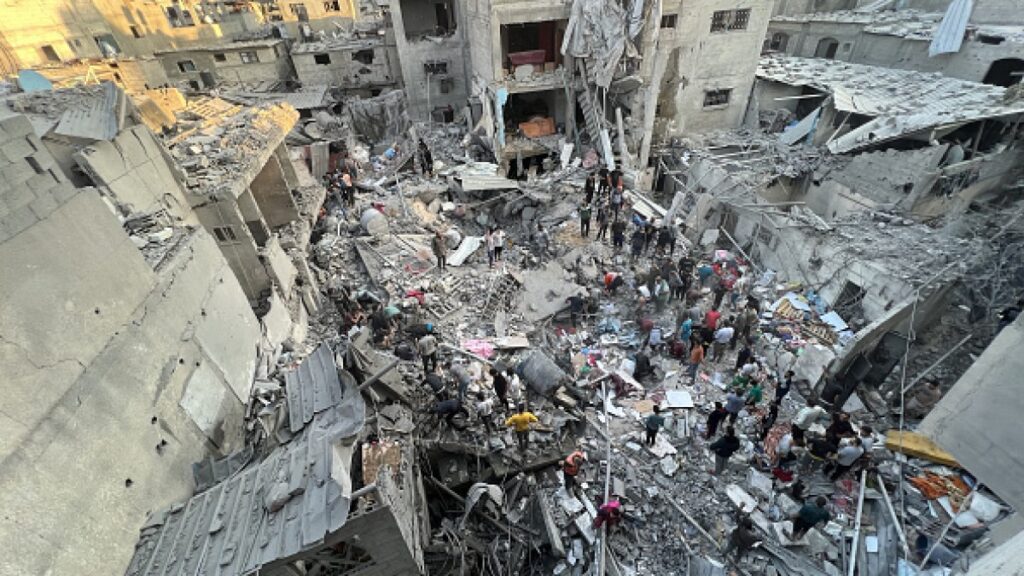In addition to ground-penetrating munitions, the United States has also supplied Israel with several other types of bombs and artillery shells.
The United States has given Israel so-called “bunker bombs” and a range of other munitions for its war on Gaza, according to a Wall Street Journal report.
Washington transferred 100 BLU-109 bombs to Israel, intended to penetrate hardened structures before detonating, the report said, citing unnamed U.S. officials.
The bomb carries a warhead weighing more than 900 kilograms (19.80 pounds) and has previously been used by the United States in conflicts, including the war in Afghanistan.
It is not the only type of munitions supplied by the United States to Israel for the war against the besieged enclave, which has so far killed more than 15,000 Palestinians, including at least 6,150 children. Hamas’ attack on Israel on October 7, which sparked the war, killed 1,200 people.
Unlike regular U.S. updates on the war in Ukraine, the Pentagon has remained mostly silent on its level of military support for Israel, amid international condemnation of Israeli military operations in Gaza.
The WSJ report says the flow of U.S. weapons to Israel since the start of the war includes 15,000 bombs and 57,000 155mm artillery shells, mostly transported aboard C-17 military cargo planes.
Washington also sent more than 5,000 Mk82 unguided bombs, more than 5,400 Mk84 bombs, about 1,000 small-diameter GBU-39 bombs and about 3,000 JDAMs, a guidance kit that turns unguided bombs into guided munitions precision, specifies the press release.
This is in addition to the billions of dollars Israel receives each year in American financial support for its military operations.
According to the WSJ, large US-made bombs were used in some of the deadliest Israeli attacks on the Gaza Strip, including a strike that destroyed a building in the Jabalia refugee camp, killing more than 100 people. Israel said the attack was justified as it killed a Hamas leader.
Israel’s intense aerial bombardment of Gaza resumed shortly after Friday’s end of a week-long truce in which dozens of captives held in Gaza were exchanged for Palestinians held in Israeli prisons. Several dozen Palestinians have already been killed less than 24 hours after the resumption of strikes.
The Israeli army, which has repeatedly asked Palestinians to evacuate northern Gaza as part of its ground operations, said on Saturday that parts of southern Gaza are now also a combat zone. People on the ground and rights groups have repeatedly said there is no safe place in Gaza.
“Questioning Congress”
Tel Aviv Tribune’s Heidi Zhou-Castro said the report on the delivery of heavy-penetration bombs to Israel raised new questions about continued US arms transfers to the country.
“These are major bombs that the United States has used in the past in its wars in Afghanistan, Iraq and Syria, but mainly in open areas… Today, Israel uses these bombs in a very different environment, in Gaza, on a densely populated civilian population. “Zhou-Castro said.
“Many people are now asking Congress whether continuing to distribute these ‘bunker bombs’ is a good idea and are also calling for more transparency,” she said.
The penetrating bombs could theoretically be used to target the tunnels that Hamas uses to move its personnel and munitions. However, the tunnels are located beneath a densely populated urban area, meaning that the use of bombs would result in many additional civilian casualties.
The United States has fully supported Israeli war efforts in the face of growing international pressure for a complete ceasefire. Washington has repeatedly said it has asked Israel to try to limit civilian casualties, even as it besieges Gaza’s main hospitals.



